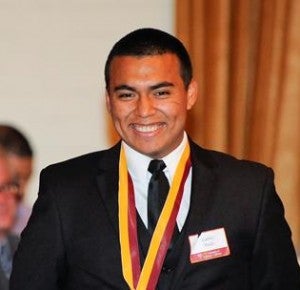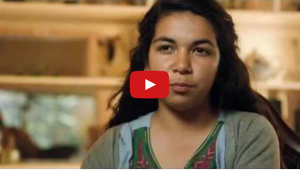Congrats NAI Grads: Headed to Penn, Middlebury and USC
 USC’s Neighborhood Academic Initiative graduates 61 South Los Angeles students, all enrolling in higher education; 11 will attend USC on full-tuition scholarships
USC’s Neighborhood Academic Initiative graduates 61 South Los Angeles students, all enrolling in higher education; 11 will attend USC on full-tuition scholarships
**This year’s NAI graduates will be honored on Thursday, May 7 at 5:30 p.m. in USC’s Town and Gown Ballroom. The students will reveal which university or college they will attend. USC Trustee Joan A. Payden, whose $5-million gift will help expand the program to USC’s Health Sciences Campus neighborhoods, will be honored.**
Contact: USC Media Relations at (213) 740-2215 or balasson@usc.edu
Which high school graduating class boasts 100 percent of its students enrolling in higher education?
All 61 graduates of USC’s Neighborhood Academic Initiative (NAI) program, an intensive program serving public school students from the university’s neighborhoods, will continue their education this fall.
Eleven of the graduates will attend USC on a full-tuition scholarship, with more headed for other top universities around the country, including the University of Pennsylvania, Middlebury College and the University of California at Los Angeles, among others.
“Education is the great equalizer. The USC Neighborhood Academic Initiative’s private-public partnership with its neighborhood schools allow cohorts of students — who enter college on unequal economic footing than more privileged peers — to be better equipped to navigate an ever-changing economy,” said Kim Thomas-Barrios, the program’s executive director.
The program’s students, almost all the first in their families to attend college, spent six to seven years coming to USC’s campus for early-morning math and English classes and after school tutoring during the week and day-long Saturday classes.
To date, 871 South L.A. students have graduated from the NAI program and gone to college.
“Programs like NAI are so important to a community because improved educational outcomes also improve health,” said Hortensia Amaro, associate vice provost for Community Research Initiatives and Dean’s Professor of Social Work and Preventive Medicine at USC.
“High school graduates live longer, are less likely to be teen parents, produce healthier children and rely less on social services,” she added. “To have a significant impact at the larger community level, we need to create pathways to higher education for a much larger group of students than we are currently able to serve through the NAI. To use a public health analogy, it’s the difference between pulling drowning people out of the river versus going upstream to address underlying causes so we can achieve better outcomes.”
Some 2015 highlights:
 • Alfa Lopez, the daughter of Central American immigrants, travelled the country on behalf of a national initiative advocating for the wellbeing of American children, while also excelling in her college prep studies at Foshay Learning Center. She will attend the University of Pennsylvania in the fall. Alfa was also one of 1,000 students nationwide named a prestigious Gates Millenium Scholar. (To view the video go to https://www.youtube.com/watch?v=1_i90zVQL-Y)
• Alfa Lopez, the daughter of Central American immigrants, travelled the country on behalf of a national initiative advocating for the wellbeing of American children, while also excelling in her college prep studies at Foshay Learning Center. She will attend the University of Pennsylvania in the fall. Alfa was also one of 1,000 students nationwide named a prestigious Gates Millenium Scholar. (To view the video go to https://www.youtube.com/watch?v=1_i90zVQL-Y)
• Steven Pham will be the fourth person in his family to graduate from NAI and go on to attend USC. He is a second-generation NAI scholar: his aunt, who raised Steven after the death of his mother, was an NAI scholar along with 2 cousins (including one who graduated among the program’s first class in 1997).
• By 2020, NAI will grow to reach some 1,100 sixth-through-12th-graders, including 600 additional children and teens in the neighborhoods near USC’s Health Sciences Campus, thanks to a $5-million gift from USC Trustee Joan Payden. Through the newly named Joan A. Payden Student Academy, NAI scholars attend classes at the University Park or Health Sciences campuses on Saturday mornings, learning time management and study skills. High school students in NAI also attend weekday advanced placement and honors classes at USC before their regular school day begins.
There is more good news from graduates of the USC TRiO program, which serves 2,500 first-generation college bound, super low-income students (150% below the poverty line) across 16 low-performing high schools in south and central Los Angeles. This year, graduates have been accepted to colleges and universities including Cornell, Stanford, Smith, University of California campuses and USC. Five students were named Gates Millennium Scholars, for a total of ten in the past two years. The federally funded programs that USC runs graduates 97 percent of its students from high school and 98 percent of those go on to higher education, the vast majority to a four-year college.
About the USC Neighborhood Academic Initiative
The USC Neighborhood Academic Initiative is a seven-year, pre-college, comprehensive educational enrichment program operated by USC Civic Engagement. NAI prepares low-income, minority students living in the neighborhoods surrounding USC for success at a college or university. Those who complete the program, meet USC’s competitive admission requirements and choose to attend USC, are awarded a 4.5-year full-tuition scholarship.
Over the past 15 years, 99 percent of NAI graduates have enrolled in secondary education programs, with 83 percent enrolling as freshmen in four-year colleges. More than one-third of NAI graduates during that time attended USC.
NAI also includes a Family Development Institute that assists parents in supporting their college-bound student with workshops and training on issues including financial literacy and college retention.
USC in the Community
The University of Southern California has been a proud and active member of its community since 1880. USC believes its strength as a great university depends on its ability to be a good neighbor. USC is dedicated to supporting healthy, vibrant and engaged communities around its University Park and Health Sciences campuses. To this end, USC supports families and youth, promotes small business development and economic growth and instills in its students a profound commitment to participate in civic life.
• USC invests $35 million annually to support community initiatives, serving 40,000 community members.
• USC students, staff and faculty devote more than 650,000 hours in the community each year.
• USC has adopted 15 neighborhood elementary, middle and high schools as part of its Family of Schools program, sharing with these schools its students and educational resources.
• USC’s local hire program puts $5 million in annual salaries back into the neighborhood.
• USC taught 60 small business owners the skills to obtain $61 million dollars in capital, contracts and loans.
• USC has more than 3,000 children in college access programs and more than 500 children in pre-school programs.
• The USC Good Neighbors Campaign raises more than a $1.5 million in donations every year for community programs through staff and faculty donations.
These efforts have been recognized on a national level by the Carnegie Foundation, the president of the American Council on Education, the World Health Organization and the “Saviors of Our Cities” survey of best university civic partnerships. Community outreach was a key factor in TIME magazine naming USC College of the Year in 2000.
USC was named to the 2014 President’s Higher Education Community Service Honor Roll with Distinction for its outstanding work in service learning projects and student volunteerism. The Corporation for National and Community Service and the U.S. Department of Education honors the nation’s leading colleges and universities, students, faculty members and staff for their commitment to bettering their communities through community service and service learning.
